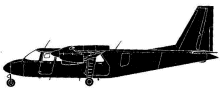
ASN Wikibase Occurrence # 320625
| Date: | Wednesday 4 December 2013 |
| Time: | 11:25 |
| Type: |  Britten-Norman BN-2A-3 Islander |
| Owner/operator: | Heringer Táxi Aéreo |
| Registration: | PT-WMY |
| MSN: | 314 |
| Year of manufacture: | 1974 |
| Engine model: | Lycoming IO-540-K1B5 |
| Fatalities: | Fatalities: 5 / Occupants: 5 |
| Aircraft damage: | Destroyed, written off |
| Category: | Accident |
| Location: | 0,5 km W of Pikany Indian Airstrip, PA -
 Brazil Brazil
|
| Phase: | Initial climb |
| Nature: | Ambulance |
| Departure airport: | Pikany Indian Airstrip, PA |
| Novo Progresso Airport, PA (NPR/SJNP) | |
| Investigating agency: | CENIPA |
| Confidence Rating: |
A Britten-Norman BN-2A-3 Islander, operated by Heringer Táxi Aéreo, crashed during a medical flight from Pikany village to Novo Progresso in Pará State. All five on board were killed.
Immediately after takeoff the left engine failed, likely as a result of fuel exhaustion. The aircraft entered a steep descent and impacted trees in the Amazon forest.
Contributing factors.
- Organizational culture - a contributor.
The utilization of an aircraft not included in the Operating Specifications and of a runway neither registered nor approved, with a pilot who did not have the amount of hours necessary nor specific training, disclose a culture based on informal practices, which led to operation below the minimum safety requirements.
- Pilots forgetfulness - undetermined.
It is possible that the pilot forgot to verify the quantity of fuel in the tanks of the aircraft before takeoff.
- Training - undetermined.
The lack of specific training for the pilot and for the coordinator who, possibly, assumed the function of instructor may have compromised their operational performance during the preparation and conduction of the flight, since they were not effectively prepared for the activity.
- Flight indiscipline - undetermined.
It is possible that the pilot failed to comply with the prescriptions of the legislation relatively to the minimum amount of fuel required for the flight leg.
The operation of the aircraft by a pilot with expired qualifications and without the required training goes against the prescriptions at the time, but it was not determined whether this pilot (coordinator) was in the aircraft controls at the moment of the accident.
The transport of a cylinder onboard the aircraft also configures flight indiscipline, since it goes against the legislation which prohibits the transport of such material.
- Instruction - undetermined.
The lack of training of the differences may have contributed to the forgetting to verify the fuel tanks, a procedure that is prescribed in the aircraft manual.
Likewise, lack of training may have deprived the pilots from acquiring proficiency for the operation of the aircraft in a single engine condition.
- Memory - undetermined.
The fact of conducting a flight to provide assistance in an emergency situation may have contributed to the pilot having forgotten to check safety parameters, such as the amount of fuel necessary.
- Motivation - undetermined.
The pilots intention to earn his operational promotion may have stimulated him excessively, to the point of disregarding the minimum safety requirements for the operation. In addition, the emergency nature of the flight request possibly added to the motivation of the pilot and the coordinator.
- Insufficient pilots experience - undetermined.
It is possible that, due to having little total experience either both of flight and in the aircraft, the pilot lost control of the aircraft when faced with the situation of in-flight engine failure after the takeoff.
- Decision-making process - undetermined.
It is possible that the pilot and the coordinator prioritized the emergency requirement of the situation, failing to evaluate other aspects relevant for the safety of the flight, such as planning, for example.
- Managerial oversight - a contributor.
The lack of control on the part of the companys management in relation to the flights operating outside of the main base allowed the pilot and the base manager to conduct a flight without the operating sector authorization.
The lack of supervision of the air transport service provision by the contracting organizations allowed the company to provide services without the minimum conditions required by the legislation.
Such conditions exposed the passengers to the risks of an irregular operation.
Accident investigation:
 |
|
Sources:
Heringer Táxi Aéreo
Índios Kaiapó morrem em queda de avião no interior do Pará (Globo, 4-12-2013)
Location
Revision history:
| Date/time | Contributor | Updates |
|---|
The Aviation Safety Network is an exclusive service provided by:


 ©2024 Flight Safety Foundation
©2024 Flight Safety Foundation